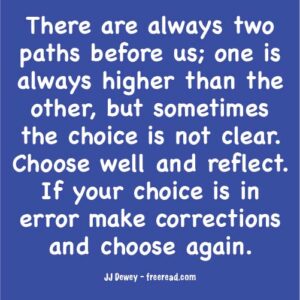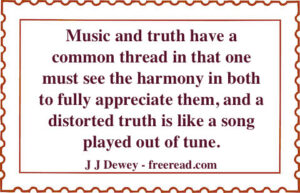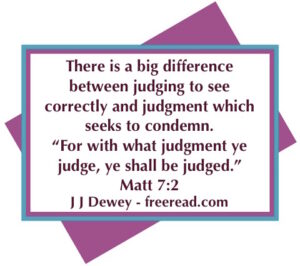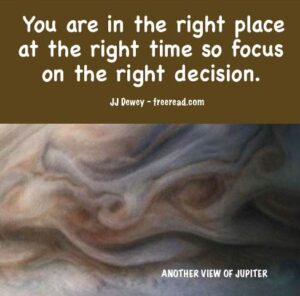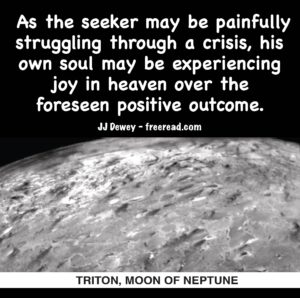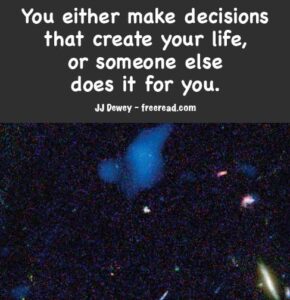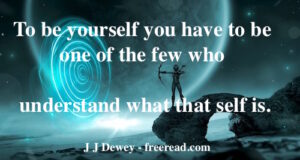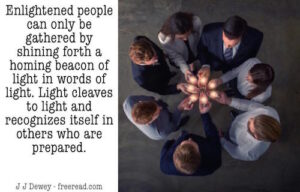
Preparing for the Worst
2021 Gathering, Part Thirteen
One of the things that I’ve noticed is the difference between somebody that’s out for their own good, versus somebody who’s truly trying to help, is that somebody who’s out for their own good will attempt to make you dependent on them.
JJ: That’s a good point.
Phillip: They will help you get so far, but they will never make you independent. Whereas somebody who is truly out to serve you, will give you all the keys that you need and cut the strings and give you the independence to move forward without them. So that they’re no longer needed.
JJ: Yeah. That’s a really great point, Phil. The true servants of humanity will try to duplicate themselves, anything, any ability they have . . . like Jesus said to his disciples, “greater things than I have done, shall you do.”
Now, what kind of person says that? We don’t hear that from our leaders, “yeah, you’re going to be greater than me.” (laughter) You don’t hear that anywhere. But Jesus said it. And it turned out that the disciples did some pretty amazing things. They raised the dead. Phillip, of that ancient time, apparently teleported himself. And they did some pretty amazing things that even Jesus didn’t do, that we know about.
Susan: There’s an interesting phenomenon going on in the LDS Church right now. It used to be that you would always hear, “follow the prophet, follow the prophet.” President Nelson is teaching the people right now to get their own revelation.
JJ: Really?
Susan: And he’s teaching them that if you don’t get your own revelation, you will not make it through the next few years. You must have your own revelation. And that is not something that has been taught in eons in the LDS faith. It’s a huge thing.
Various people commenting.
JJ: Now my brother-in-law tells me the LDS are also preparing places in camps if there’s an emergency, that people can escape to?
Susan: They’ve tripled a lot of the girls’ camps and boys’ camps, and their drilling wells, and they’ve put white tents, huge white tents all over the United States.
JJ: To prepare?
Susan: To prepare.
JJ: Well maybe if they listened to Curtis and me when we went there and visited with McConkie and Petersen. They said, “We understand you got some kind of message. What’s your message?” And we told them, “You’re completely unprepared if the economy falls apart”
They read my treatise, or my novelette about “The Journey’s End.” It begins with the excommunication of Curtis, which was true. And then it goes into fiction, where the LDS people are hunted down because they have a year’s supply, and when the economy collapsed. The LDS turned out to be the ones that are hunted down by mobs. They had no place to go. And Petersen looked at that and he said, “This is written by the devil himself.”
Curtis: “This is hell spawned,” he said.
JJ: “Hell spawned.” He said, “this is worse than Playboy!” (laughter) Playboy was the worst thing he could think of. To compare it to.
Susan: But it’s different now. That’s what I’m telling you.
JJ: Maybe they listened to Curtis and me.
Susan: Maybe they did.
JJ: Maybe somebody thought, “well, maybe they have a point. We need to prepare. We’re not prepared.”
Curtis: Can they get their own revelation then on the vaccination?
Susan: What President Nelson said two months ago was to counsel with your medical people and get the guidance of the holy ghost. So he definitely told people.
JJ: But they pretty much gave a command to get the vaccination.
Susan: Well, isn’t there always a paradox given, just like in the Garden of Eden? You’re told to do one thing, then you’re told to do another thing. And there’s a complete paradox. And the Church is being rent in two because of it.
JJ: I know I read that a lot of Mormons aren’t going along with the vaccination thing.
Phillip: If you look at the history of Nelson . . . Nelson had a pretty intense revelation as a doctor. He learned a new technique while he was on the operating table working on a guy. It was entirely the guy’s faith that pushed Nelson into it . . . if you hear the story. The guy said, “you need to do an operation.” Nelson said, “I don’t know what to do. There’s no solution for this.” And the guy said, “I have faith, I know the Lord will tell you. Just move forward.”
So Nelson opens him up. He’s doing open heart surgery. And as Nelson is doing the operation, he had a revelation of how to fix this guy’s heart using special stitches. And so he could see how it was going to work. He performed it. He tested it. Everything worked out great. He closed the guy up. And he had this amazing experience powered by this guy’s faith, but also his faith because he actually did the work.
But having that experience really impacted his life. One of his major revelations that he refers to. And so he knows that revelation is real and he’s encouraging other people to have similar type experiences. So it was majorly impacting on his life.
Now right on his heels is Oaks. Oaks is next in line to be the prophet and he’s very much, “follow the leaders. If your revelation contradicts, you’re wrong, the leaders are right.” And so, there’s kind of two thought forms that are being pushed at the same time.
JJ: Yeah, interesting.
Phillip: It is interesting, and I hope Nelson outlasts Oaks. (laughter)
JJ: It’s kind of funny with Curtis and me. We went to the Church headquarters, warned them that they were ill-prepared, and they needed to do something to prepare for an economic collapse.
But what would be frustrating to Curtis and me, is if there was a collapse and all the sudden the Church followed our advice and they’re prepared, and we aren’t, and they wouldn’t let us survive. (laughter) They won’t let us participate because we’re excommunicated. (laughter) That would be kind of ironic.
Curtis: We know where their food is stored. (laughter)
JJ: I was hoping by this time, from when I first started teaching The Gathering, we would have a whole city built and we would be completely self-sustaining. But that did not happen.
Asaph: Yet.
JJ: Not yet. So hopefully it will happen in time when it is needed.
Okay, any other comments or questions on the Middle Way?
Curtis: I was going to say on the Middle Way, it wasn’t that Joe and I wanted to be excommunicated. We wanted to appeal our excommunication. So we went see Bruce R. McConkie and Mark E. Petersen because we wanted to get back into the Church, because we felt like we could do more good in the Church than out of the Church. Plus we didn’t feel like we had done anything to merit excommunication.
So we went to find out if we could have a retrial. And they said, “we don’t do retrials anymore.” We don’t have that quorum of twelve. See in the Doctrine and Covenants there are two groups of twelve. A traveling high council and standing high council. The standing high council stood to judge difficult cases. And we presented a difficult case.
And so they said, “we’re not doing that anymore.” And we took the scriptures and we said, “well, it says right here if you don’t follow the scriptures, the way they’re written, you will be damned.” It says that in Section 29. And it says in Section 132 that we had the right to a retrial “as though no such decision had been made.”
So we said, “we have a right to a retrial and you’re denying us that privilege. And if you don’t give us a retrial, and you’re not you’re not following the scriptures, then you will be damned if you so continue.”
Well that really upset them. We said that and because we said that the interview pretty much ended. But we weren’t anti-Mormon or anything. We were pro truth. And what we wanted was to be heard and have a retrial “as though no such decision had been made.”
JJ: Yeah, actually I didn’t want back in it myself. I just wanted the Church to face the reality of what they were trying to do to us. We wanted them to defend the fact that they were trying to excommunicate us unjustly. And so we did our best to make that happen.
To search the website, containing millions of words, replace the word “search” with the word or phrase you want to find and place the entire line in the Google search box.
“Search” site:freeread.com
Easy Access to All the Writings
For Free Book go HERE and other books HERE
JJ’s Amazon page HERE
Check out JJ’s Facebook Group HERE
